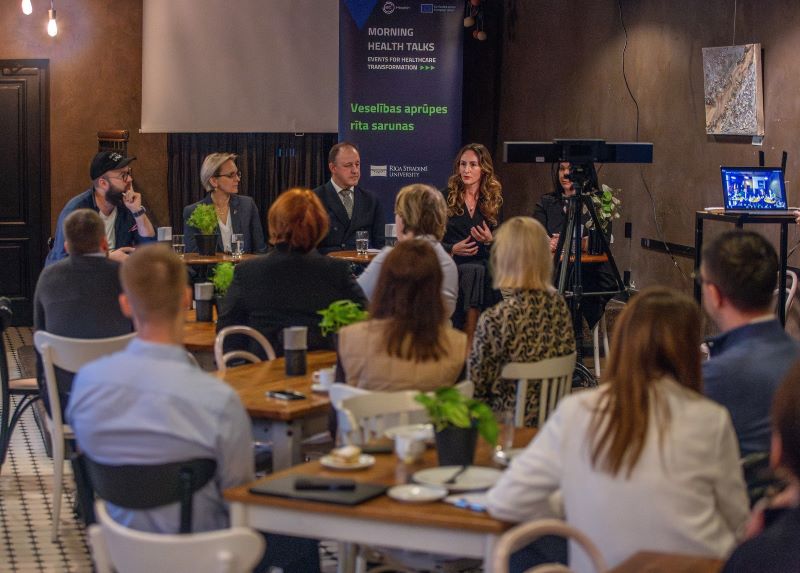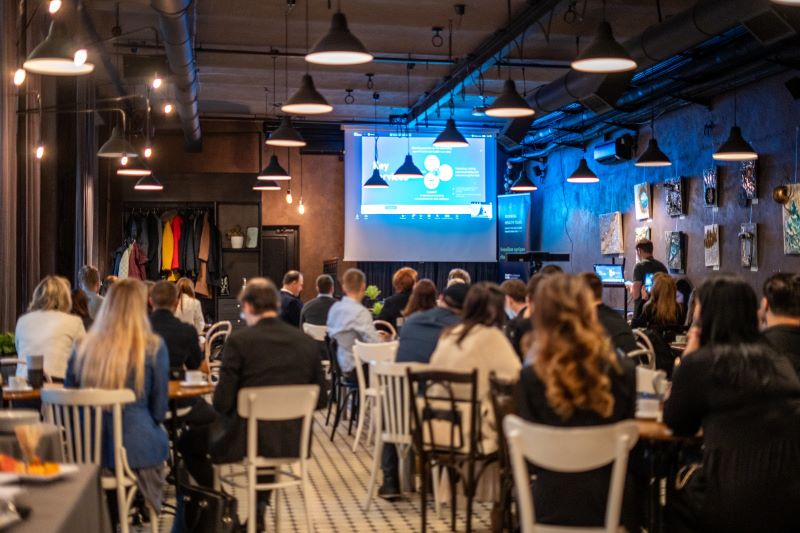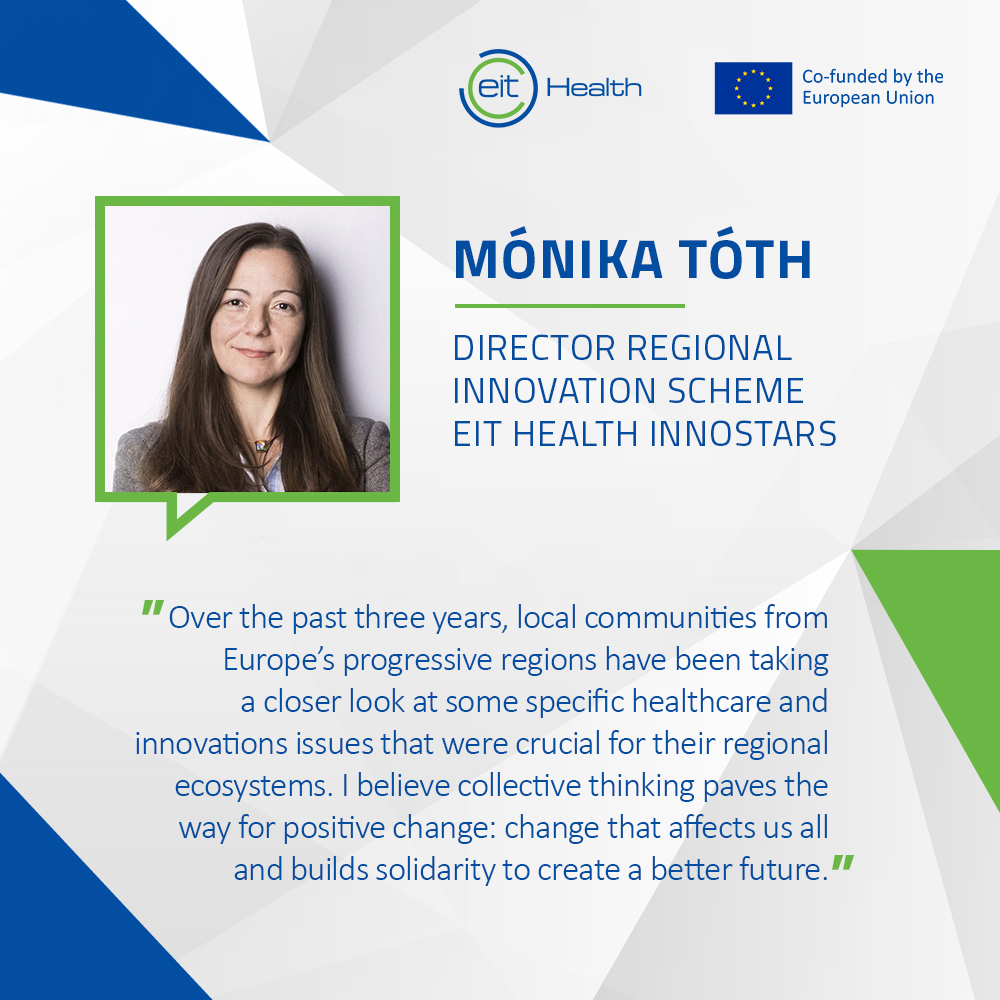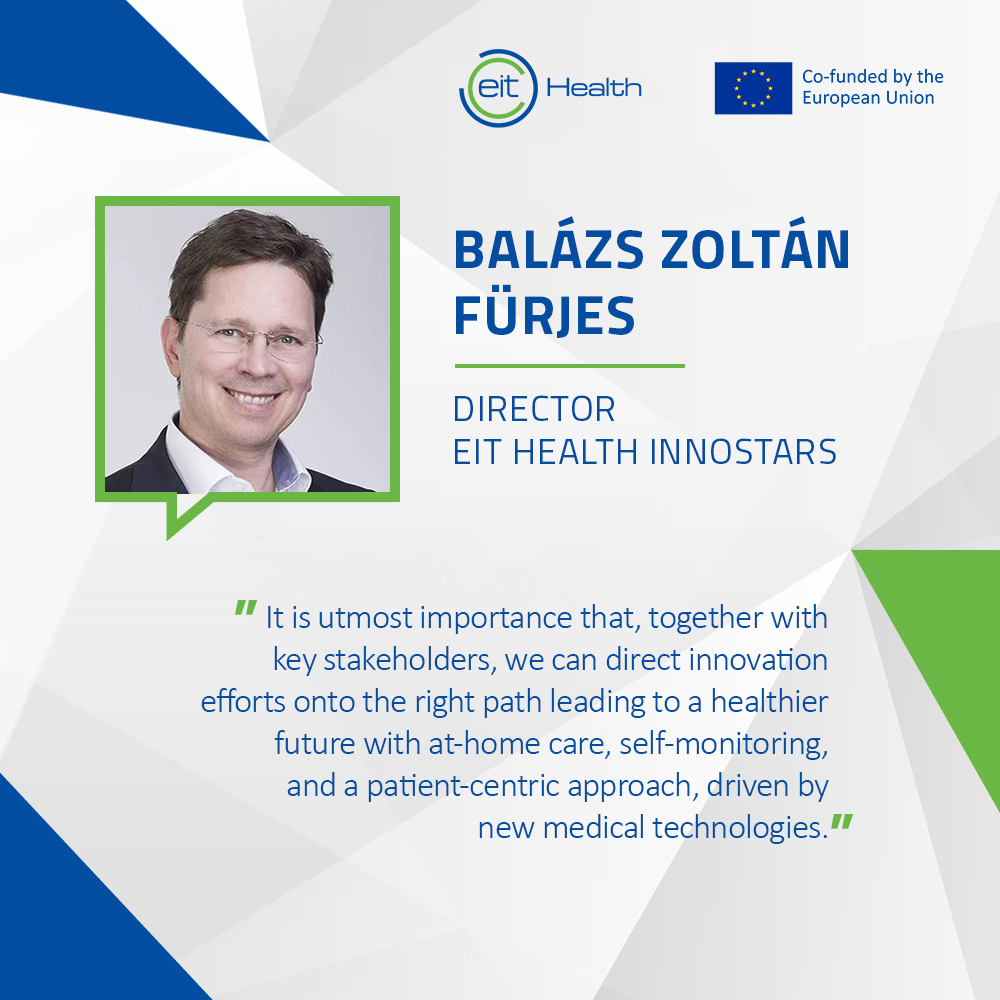EIT Health Healthcare Morning Talks focus on data sharing in open innovation alliances
This year's second EIT Morning Health Talks took place on 14 November 2024. As in the first event, talks focused on Open Innovation Journeys: Collaborative Pathways, Alliances and Networks, getting an insight into open innovation alliances and how these alliances can contribute to data sharing in sandbox environments.
 The discussions that create a network environment for healthcare thinkers and doers
The discussions that create a network environment for healthcare thinkers and doers
EIT Health Morning Health Talks continued to focus on data sharing in open innovation alliances
The second EIT Health Morning Health Talks of the year took place on 14 November 2024. The event continued to focus on the theme of Open Innovation Journeys: Collaborative Pathways, Alliances and Networks, getting an insight into open innovation alliances and how these alliances can contribute to data sharing in sandbox environments.
Innovating the secondary use of health and social data
Local Latvian healthcare industry had the opportunity to get insight into the best practice and learn about Finnish experience in innovating the secondary use of health and social data at the event organised by the EIT Health RIS Hub in Latvia (European Institute of Innovation and Technology Health Knowledge and Innovation Community Regional Innovation Scheme). Peija Haaramo, Chief Specialist at Findata (Social and Health Data Permit Authority) in her online presentation explained the Finnish model for the secondary use of health and social data, with particular focus on Findata's role. In Finland the cornerstones for data secondary use are combined of personal identity code (key for linking personal information from various registers), rich national data registers with long time series (in practice 100 % coverage of Finnish population), opt-out principle in secondary use of social and health data (consent not required for registry-based research), high trust (data security and data protection), legal basis (Act on Secondary Use of Health and Social Data since 2019). Findata, established under this act, is an independent authority responsible for issuing data permits, ensuring data security, pseudonymization, and secure analysis via its Kapseli environment. By linking diverse health and social data from multiple sources, Findata enables research, planning, and statistical analyses in a secure manner, as well as Findata has been and is involved in several projects which prepare for the implementation of European Health Data Space (EHDS).
 Findata chief specialist Peija Haaramo’s online presentation
Findata chief specialist Peija Haaramo’s online presentation
The Role of Sandboxes and Secure Data Environments
In the following multi-stakeholder panel discussion attended by representatives from public administration, healthcare institutions, academic institutions and healthcare companies, participants were exploring data governance models in open innovation environments. Discussion highlighted that in health data contexts, the need for secure data environments is critical, as health data is particularly sensitive.
In the meanwhile, healthcare professionals in Latvia face significant challenges in properly documenting data due to time constraints and the technical complexities of data entry. The lack of standardized approaches across institutions aggravates the problem. Pilot projects could be a feasible starting point to introduce standardized data systems within specific healthcare sectors, acknowledging the difficulty of harmonizing legacy systems.
Karina Palkova, Dean of the Faculty of Social Sciences, Rīga Stradiņš University (RSU), noted that data sandboxes could facilitate research by allowing access to real-world health data in a controlled manner, ensuring that sensitive information is protected while enabling the secondary use of the data for scientific purposes.
Data sandboxes could be an opportunity for different stakeholders (such as healthcare providers, researchers, and technology companies and startups) to collaborate on solving complex data challenges. They would create a platform for sharing knowledge and aligning efforts to improve data infrastructure, which is crucial for making secondary data use more efficient and reliable.
Collaboration and trust
Discussion highlighted that stakeholders, including patient organizations, researchers, and policymakers, need to collaborate more closely. Baiba Ziemele, Head of Latvian Network of Patient Organizations, underscored that patient (qualified representatives) involvement is critical for ensuring trust and relevance in innovations, as well as their involvement is crucial from the early stages of innovation development. The patient organizations emphasize the need for proper inclusion of patients in decision-making regarding their data.
Emil Syundyukov, co-founder and CEO of Longenesis, also indicated that trust among stakeholders and especially from general public is a critical factor, citing from the Finnish presentation that “Trust is a must”.
Latvia has a relatively weak non-governmental organizations (NGOs) culture, pointed out Rolands Strazdiņš, Chairman of the Board of the Latvian Open Technology Association (LATA), but NGOs should have an essential role in advancing proposals for political discussion and organizing the health data sector. And companies should support NGOs with resources for preparing quality proposals.
While an active initiative for pilot data sandbox from companies and openness from hospitals is needed, the Latvian Digital health centre (LDVC) recently established by the Ministry of Health could play a significant role in developing this initiative.
Current situation and development perspectives
Although the Central Statistical Bureau (CSP) is already implementing secure data environment for researchers to work with anonymized or pseudonymized data, local researchers have been relatively inactive in requesting access to microdata, remarked Baiba Zukula, Deputy Director General of the Central Statistical Bureau of Latvia. Also, CSP currently does not have health data.
In future the CSP is open to the idea of multiple secure data environments in Latvia, but we need to evaluate how many such environments Latvia actually needs. Currently, at the state institution level, the CSP's secure data environment is considered sufficient. Universities and hospitals are key players in utilizing and developing secure data environments, especially as data demand is expected to grow in future.
"When discussing primary data, it’s crucial to address the challenges of using historical data for secondary purposes, since it often lacks structure, context, and quality due to its evolution over time. Preparing such data for modern processing requires significant resources. A potential solution is data licensing, where organizations that invest in structuring and digitalizing these datasets can share them with others for a license fee. I believe Latvia should consider implementing a licensing model that connects primary and secondary data. This model should be regulated by the state, with clear rules and procedures. The data would be provided through a secure processing environment, while the license would belong to a respective research organization.", suggested Rolands Strazdiņš in conclusion.
Karina Palkova also added, "From a legal perspective, I think, top priority is to ensure the adoption of the law on secondary data use in the country. This will establish a clear understanding of its meaning and requirements for everyone involved. Once this is in place, we will also gain better clarity regarding the regulation of primary data, as these are two parallel and interconnected processes. Furthermore, we will be able to identify the challenges that arise when primary and secondary data intersect."
- Agenda
9:00–9:05 Opening Dins Šmits, Vice-Rector for Academic Affairs, RSU 9:05–9:35 Presentation in English on Finnish experience in innovating the use of health data Peija Haaramo, PhD, Chief Specialist at Findata (Social and Health Data Permit Authority)* 9:40–10:40 Multistakeholder panel discussion in Latvian: Balancing Innovation, Privacy, and Patient Rights in Healthcare Data Sandboxes Emil Syundyukov, Longenesis CEO and Co-founder; moderator of discussion
Baiba Zukula, Deputy Director General, Central Statistical Bureau of Latvia
Rolands Strazdiņš, Chairman of the Board, Latvian Open Technology Association (LATA)
Baiba Ziemele, Head of Latvian Network of Patient Organizations
Karina Palkova, Dean, Faculty of Social Sciences, RSU10:40–12:00 Networking over brunch (for onsite participants)
* Peija Haaramo, PhD, Chief Specialist at Findata (Social and Health Data Permit Authority), has extensive experience in the Finnish secondary use of health data and EU initiatives (TEHDAS, healthdata@eu pilot and TEHDAS2). She has collaborated in the VALO Project (Value from Nordic Health Data), an initiative of the Nordic Council of Ministers for collaborative preparations and implementation of the coming European Health Data Space (EHDS), focusing on secondary use of healthdata, e.g. for research and innovation.
The event is organized by the Latvia Hub of EIT Health - European Institute of Innovation & Technology Health Knowledge and Innovation Community. EIT Health RIS hub in Latvia operates from Rīga Stradiņš University (RSU).
The first EIT Health Morning Health Talks of the year took place on 6 June 2024.
About EIT Health Morning Health Talks
EIT Health Morning Health Talks (MHT) is an invitation-only event series in 13 EIT RIS countries with the purpose of creating an opportunity for high-and middle-level healthcare stakeholders, professionals and decision-makers to network, exchange perspectives and practices over business breakfast. The discussions that create a network environment for healthcare thinkers and doers.
Event Highlights
- Networking opportunities
- Expert insights
- Inspiration and motivation
- Community Engagement
Target Audience
- Business Leaders (MedTech, IT, Biotech)
- Academia (Medical, Pharma, Technical, Economic Universities - Faculty)
- Healthcare Providers (Hospitals, Ambulatory Care, Long-Term Care)
- Research Institutions and Incubators
- Public Administration and Governmental Organizations
- Professional Bodies, Investors, and Start-Ups with at least a proof of concept
Background
Morning Health Talks, part of the EIT Health RIS Programme 2020, fosters local healthcare innovation ecosystems through productive stakeholder discussions, relationships, and collaborative advancements. Morning Health Talks aim to raise awareness of health issues that are important globally but need to be addressed with local stakeholders.


Related news
 Latvian scientists are preparing for the first BioPhoT project submissionFor Students, Innovation, For RSU Employees, For PhD Students, Research
Latvian scientists are preparing for the first BioPhoT project submissionFor Students, Innovation, For RSU Employees, For PhD Students, Research


